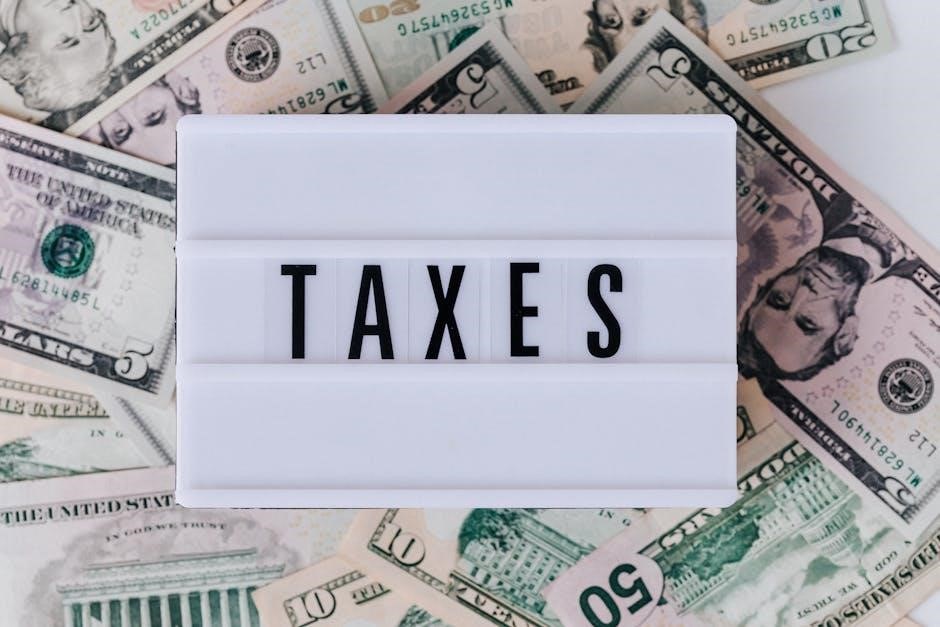
income tax ordinance 2001 pdf
The Income Tax Ordinance, 2001, is a comprehensive law governing income tax in Pakistan, enacted to regulate taxation effectively.
1.1. Overview of the Ordinance
The Income Tax Ordinance, 2001, is the primary legal framework governing income taxation in Pakistan. It outlines definitions, charges, and compliance requirements, ensuring a structured approach to tax collection. The ordinance covers various income sources, deductions, and exemptions, promoting fair taxation. Regular updates and amendments have been made to align with economic changes, making it a dynamic and essential component of Pakistan’s tax system.
1.2. Historical Context and Enactment
The Income Tax Ordinance, 2001, was enacted to modernize Pakistan’s tax framework. It came into force on July 1, 2001, and applies nationwide. The ordinance aimed to consolidate and update existing tax laws, providing clarity and structure. It replaced earlier tax laws and has since undergone amendments, such as through the Finance Act 2014, to adapt to economic changes and ensure alignment with global tax standards and practices.

Key Provisions of the Income Tax Ordinance 2001
The ordinance outlines the legal framework for income taxation, defining taxable income, exemptions, and deductions. It regulates tax rates, payments, and compliance, ensuring a structured tax system nationwide.
2.1. Definition and Scope of Taxable Income
Taxable income under the Income Tax Ordinance, 2001, includes income from all sources, such as business, employment, property, and investments. Section 4 specifically defines taxable income as income chargeable to tax under various heads, including income from business, employment, property, and other sources. The ordinance provides detailed provisions for determining the scope of taxable income, ensuring clarity on what constitutes taxable income and the applicable exemptions and deductions, with the Federal Board of Revenue (FBR) overseeing compliance.
2.2. Tax Rates and Exemptions
The Income Tax Ordinance, 2001, outlines progressive tax rates based on income levels, ensuring higher incomes are taxed at higher rates. Specific exemptions are provided for certain types of income, such as those from diplomatic missions or specific investments. The ordinance also allows for tax credits and deductions for eligible payments, reducing taxable liability. These provisions aim to balance revenue collection with taxpayer relief, promoting economic growth and fairness;
Charging of Income Tax
Income tax is levied annually on taxable income under the Income Tax Ordinance, 2001. Rates vary based on income levels, ensuring compliance with legal frameworks.
3.1. Tax on Taxable Income
Taxable income under the Income Tax Ordinance, 2001, is calculated by deducting allowable deductions from total income. It includes income from all sources, such as business, employment, property, and investments; The tax rates are progressive, increasing with higher income levels. Specific sections outline deductions for business profits, interest, and other allowable expenses, ensuring fair assessment and compliance with legal standards.
3.2. Tax on Dividends and Other Payments
Tax on dividends and other payments is governed by specific provisions of the Income Tax Ordinance, 2001. Dividends are taxable under Section 4, while other payments, such as royalties and interest, are subject to withholding tax. The Ordinance also addresses tax on shipping and air transport income of non-residents, ensuring compliance with international tax standards and proper reporting requirements for all taxable payments.

Computation of Taxable Income
The computation of taxable income under the Income Tax Ordinance, 2001, involves defining income from various sources, including business, employment, property, and other gains, and applying allowable deductions and exemptions to determine the final taxable amount.
4.1. Income from Business and Employment
Under the Income Tax Ordinance, 2001, income from business and employment is classified as taxable income. This includes salaries, wages, professional fees, and profits derived from business activities. Allowable deductions are permitted for expenses incurred in generating such income, ensuring a fair assessment of taxable amounts. The Ordinance provides detailed guidelines to differentiate between taxable and non-taxable components of business and employment income, ensuring clarity for taxpayers. Proper documentation and adherence to specified provisions are essential for accurate computation and compliance. The Federal Board of Revenue (FBR) oversees the implementation of these regulations to maintain consistency and fairness in taxation. Taxpayers are required to maintain records of their income and deductions to facilitate accurate tax calculations and avoid penalties for non-compliance. This section is crucial for individuals and businesses to understand their tax obligations and benefits under the Ordinance. The Ordinance also outlines specific provisions for different types of employment income, such as bonuses and allowances, ensuring comprehensive coverage of all potential sources of taxable income from business and employment. By adhering to these guidelines, taxpayers can ensure they meet their legal obligations while optimizing their tax positions. The Ordinance’s provisions are regularly updated to reflect economic changes and ensure fairness in the tax system. Understanding these provisions is essential for effective tax planning and compliance. The FBR provides resources and guidelines to assist taxpayers in navigating the complexities of income taxation under this section. Overall, the Income Tax Ordinance, 2001, provides a structured framework for assessing and taxing income from business and employment, promoting transparency and equity in Pakistan’s tax system.
4.2. Income from Property and Other Sources
Income from property, such as rent and capital gains, is taxable under the Ordinance. Other sources include dividends, interest, and royalties. Allowable deductions are provided for expenses related to property income, like maintenance and taxes. Specific provisions govern the taxation of gains from property disposal, with exemptions for certain cases, such as properties held for more than five years. The Ordinance ensures fair assessment of income from property and other non-business sources, promoting compliance and equitable taxation. Proper documentation is essential for accurate tax calculations and to avoid penalties. This section is vital for understanding tax obligations related to property and diverse income sources, ensuring adherence to legal requirements and optimizing tax positions. The Federal Board of Revenue (FBR) provides guidelines to facilitate compliance with these provisions, which are regularly updated to reflect economic changes and maintain fairness in the tax system. Understanding these provisions is crucial for effective tax planning and ensuring transparency in income reporting. The Ordinance’s framework for property and other sources of income contributes significantly to Pakistan’s tax system, ensuring a balanced approach to taxation.
Tax Credits and Deductions
The Ordinance allows tax credits for specific payments like withholding taxes and deductions for allowable expenses, ensuring fair assessment of taxable income and promoting compliance.
5.1. Allowable Deductions Under the Ordinance
The Income Tax Ordinance, 2001, outlines specific allowable deductions, enabling taxpayers to reduce taxable income. These deductions include expenses directly related to income generation, such as salaries, rent, and utility bills. Additionally, certain depreciation and interest payments on loans used for business purposes are deductible. However, deductions are disallowed for expenses lacking proper documentation or deemed personal in nature, ensuring compliance with legal and regulatory standards.
5.2. Tax Credits for Specific Payments
Tax credits under the Income Tax Ordinance, 2001, provide relief for specific payments, reducing the final tax liability. These credits apply to dividends, interest, and other eligible payments made to residents. Credits are also available for withholding taxes on salaries, services, and certain business transactions. Additionally, donations to approved charitable organizations and investments in specified sectors may qualify for tax credits, subject to documentation and regulatory approval.
Tax Administration and Compliance
The Federal Board of Revenue (FBR) oversees tax administration, ensuring compliance with the Income Tax Ordinance, 2001. Taxpayers must file returns, pay taxes, and maintain records accurately.
6.1. Role of the Federal Board of Revenue (FBR)
The Federal Board of Revenue (FBR) is responsible for administering and enforcing the Income Tax Ordinance, 2001. It oversees tax policy implementation, collection, and compliance. The FBR ensures proper assessment, auditing, and recovery of taxes. It also provides guidance to taxpayers and resolves disputes. Additionally, the FBR manages withholding taxes, issuing refunds, and maintaining taxpayer records. Its role is crucial in ensuring the effective operation of Pakistan’s tax system under the Ordinance.
6.2. Obligations of Taxpayers
Taxpayers under the Income Tax Ordinance, 2001, are required to register, file tax returns, and pay taxes timely. They must maintain accurate records and provide necessary documentation. Compliance with withholding tax obligations is mandatory for employers and deductors. Taxpayers must also respond to FBR notices and cooperate during audits; Non-compliance may result in penalties, emphasizing the importance of adhering to legal requirements to avoid disputes and ensure smooth tax administration.
Amendments and Updates to the Ordinance
The Income Tax Ordinance, 2001, has undergone regular updates to align with economic needs, ensuring fairness and compliance with international tax standards while addressing loopholes.
7.1. Key Amendments Over the Years
The Income Tax Ordinance, 2001, has seen significant amendments to enhance tax compliance and align with economic reforms. Key updates include changes to withholding tax provisions, exemptions for specific transactions, and adjustments to tax rates. The Finance Act 2014 omitted Section 4A, while later amendments introduced stricter penalties for non-compliance. Recent updates have focused on simplifying tax procedures and promoting transparency in financial transactions.
These changes reflect Pakistan’s commitment to modernizing its tax system.
7.2. Impact of Amendments on Taxation
The amendments to the Income Tax Ordinance, 2001, have significantly influenced Pakistan’s taxation system. Changes in withholding tax provisions and exemptions have streamlined tax procedures, enhancing compliance and reducing evasion. Adjustments to tax rates and penalties have encouraged voluntary tax payments, boosting revenue collection. These reforms have also promoted financial transparency, aligning the country’s tax policies with global standards and fostering economic stability.
Overall, the amendments aim to create a fairer and more efficient tax environment.

International Tax Provisions
The Income Tax Ordinance, 2001, addresses international taxation through Double Taxation Agreements (DTAs) and specific provisions for non-residents, ensuring tax clarity and compliance.
8.1. Double Taxation Agreements
Double Taxation Agreements (DTAs) under the Income Tax Ordinance, 2001, aim to prevent income from being taxed in multiple jurisdictions. These agreements allocate taxing rights between countries, ensuring individuals and businesses are not burdened by dual taxation. DTAs promote cross-border trade, investment, and cooperation, aligning with international tax standards. Pakistan has entered into numerous DTAs with other countries to facilitate tax certainty and avoid fiscal disputes.
8.2. Taxation of Non-Residents
The Income Tax Ordinance, 2001, governs the taxation of non-residents, focusing on income derived from Pakistan. Non-residents are taxed on income sourced within the country, such as business profits, royalties, and interest. Specific provisions, including Section 4A, outline the scope of taxable income for non-residents. Withholding taxes apply to certain payments made to non-residents, ensuring compliance with the Ordinance. These regulations clarify the tax liabilities of non-residents, promoting transparency and fair taxation practices.

Penalties and Enforcement
The Ordinance imposes penalties for non-compliance, including fines and imprisonment, ensuring adherence to tax laws. Enforcement mechanisms are strictly implemented to maintain tax discipline and compliance.
9.1. Penalties for Non-Compliance
The Income Tax Ordinance, 2001, prescribes penalties for non-compliance, including fines and imprisonment. Tax evasion, false reporting, and failure to file returns attract severe penalties. The penalties are proportional to the severity of the offense, ensuring compliance with tax laws. These measures are enforced to maintain tax discipline and uphold the integrity of the taxation system in Pakistan.
9.2. Dispute Resolution Mechanisms
The Income Tax Ordinance, 2001, establishes mechanisms for resolving tax disputes, ensuring fairness and transparency. Taxpayers can file appeals against assessments to the Commissioner of Income Tax, followed by the Income Tax Appellate Tribunal and higher courts. These mechanisms aim to address grievances efficiently while maintaining legal standards, ensuring compliance and fostering trust in the tax system. They are designed to resolve disputes amicably and expeditiously.
The Income Tax Ordinance, 2001, serves as a cornerstone of Pakistan’s tax system, ensuring equitable taxation and fostering economic growth through its comprehensive provisions and updates.
10.1. Summary of Key Points
The Income Tax Ordinance, 2001, is a detailed framework regulating income tax in Pakistan. It defines taxable income, outlines tax rates, and specifies deductions and exemptions. The ordinance also covers tax administration, compliance obligations, and penalties for non-compliance. Regular amendments ensure alignment with economic changes, making it a dynamic tool for revenue generation and fiscal regulation in Pakistan’s tax system.
10.2. Importance of the Ordinance in Pakistan’s Tax System
The Income Tax Ordinance, 2001, is pivotal in Pakistan’s tax framework, ensuring structured revenue collection and promoting economic stability. It aligns tax policies with national objectives, fostering compliance and fairness. By addressing diverse income sources and providing clear guidelines, the ordinance supports sustainable development and strengthens the nation’s fiscal infrastructure, making it indispensable for effective governance and public welfare.